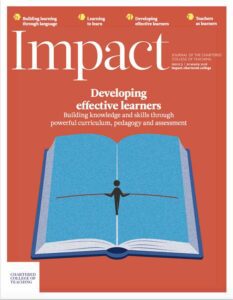How can we use evidence to help students become more effective learners?

In recent years, there appears to have been a growing trend for school teachers and leaders to be shunning educational fads and gimmicks in favour of a more evidence-informed approach. This is encouraging, and a positive move for teachers; it feels like we are reclaiming our profession. As we learn more from the world of educational research, from topics such as metacognition and cognitive scienceThe study of the human mind, such as the processes of though... More, our understanding of how students learn grows stronger. It is essential that we use this evidence to inform our teaching, so that our students become confident and successful learners.
As a research school, Durrington has been using this evidence to shape our practice and to help other schools to develop this area of their practice. This article will explore:
- How we have used the evidence around metacognition and cognitive science to support our students to become more effective learners
- How we provide rich CPD for our staff to enable them to focus on mobilising this research evidence
- How as a research school we support other schools to develop this approach.
Supporting our students
In ‘Improving students’ learning with effective learning techniques’, Dunlosky et al. (Dunlosky et al., 2013) identified learning strategies that appeared to have the most impact in terms of supporting learning:
- practice testing – self-testing or taking practice tests on to-be-learned material
- distributed practice – implementing a schedule of practice that spreads out study activities over time
- interleaved practice – implementing a schedule of practice that mixes different kinds of problems, or a schedule of study that mixes different kinds of material, within a single study session
- elaborative interrogation – generating an explanation for why an explicitly stated fact or concept is true
- self explanation – explaining how new information is related to known information, or explaining steps taken during problem-solving.
The Learning Scientists (Learning Scientists, 2017), a group of cognitive psychologists in the USA, provide resources for these strategies and have added two more:
- dual codingIn qualitative research, coding involves breaking down data ... More – combining words and visuals
- concrete examples – using specific examples to explain abstract ideas.
At Durrington, we want our students to be making the best use of their learning time in lessons and at home, as well as when revising. To support this, we explicitly teach them these strategies, using a variety of approaches:
- All year groups have had assemblies explaining these strategies to them
- Year 10 and 11 tutor groups have had input during their form group time on these strategies, led by members of the research school team
- Years 7, 8 and 9 have a termly challenge set for them, which focuses on one of the strategies, e.g. produce a set of flashcards to support practice testing of key geographical terms in Year 7; use dual coding to create pictures that will help you to remember a set of academic words
- Year 11 students have a ‘revision booklet’ that describes each of the strategies
- Evening workshops teaching the strategies have been organised for students and parents/carers
- When teachers are discussing revision with students, they use the language of these strategies.
Supporting our staff
So that our staff are confident with these strategies, we provide a range of CPD strategies to support their use:
- We have used INSET days to explicitly ‘teach’ staff about these strategies – why they work and how to use them.
- There is then time put aside on INSET days for subject teams to discuss how the strategies can be implemented in their subject.
- At subsequent INSET days, staff from a range of subjects have shared how they have implemented the strategies in their classrooms. This has also taken place through voluntary, after-school ‘15 minute forum’ sessions, where staff share their classroom practice with their peers.
- Every fortnight, subject teams meet for a ‘Subject Planning and Development Session’. During these meetings, they discuss what they will be teaching over the next fortnight and how to teach it well. This will involve discussing and sharing opportunities for practice testing, elaborative interrogation, etc.
- We use our school blog https:// classteaching.wordpress.com/ and research school blog https://durrington. researchschool.org.uk/ to share examples of how teachers have mobilised these strategies.
Supporting other schools
As a research school, we have already worked with hundreds of teachers and leaders from across the south of England to embed these strategies. For example:
- We post weekly articles on our research school blog about evidence-informed practice. As an example, we recently published an article, ‘15 myths about memory and learning’, that unpicks some of the most common myths that are not necessarily that helpful in terms of developing effective teaching: https://durrington.researchschool. org.uk/2018/02/26/15-myths-aboutmemory- and-learning/.
- We publish a monthly newsletter, featuring articles and links aimed at helping teachers and leaders to implement these ideas.
- We run a number of three-day training programmes here at the Durrington Research School, based on a variety of topics. One of these is specifically focused on memory and learning – ‘Improving Memory for Success in GCSE Terminal Examinations’.
- We have led free twilight sessions for teachers on a range of topics to give them an insight into what the evidence says about effective practice. We are also going to offer ‘roadshows’ to schools, where we come to your schools and offer to lead a twilight on topics such as ‘improving memory’ or ‘evidence-based approaches to revision’ for schools in your locality.
- We have also led INSET days in schools that have focused on evidence-informed approaches to teaching.
- We hosted a ResearchEd conference on 28 April 2018, with a fantastic line-up of speakers.
We are enjoying our journey towards becoming a more evidence-informed school. We are also finding it immensely rewarding working alongside teachers and leaders from other schools, who are on the same journey. Please do get in touch if you would like to find out more: sallison@durring.com.










